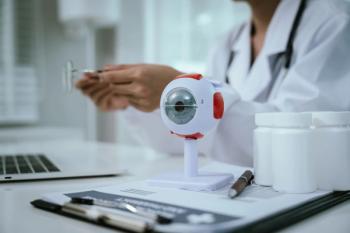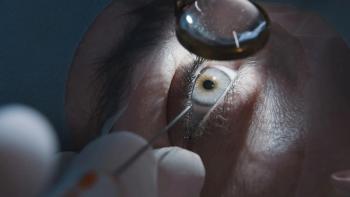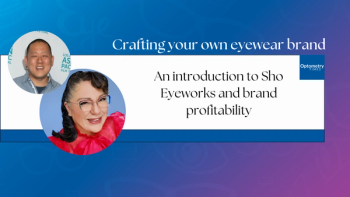
Movie shows ODs are more than glasses prescribers

Editor in Chief Gretchyn M. Bailey: Hi, everyone. Thanks for joining us today. I am talking with Dr. Kerry Gelb, who is in practice in Woodbridge, NJ, and he is about to have the world premiere of his movie called Open Your Eyes and he's going to talk to us about it. So, Dr. Gelb, thank you so much for talking with me today.
Kerry Gelb, OD: Well, thank you. Thank you for having me.
Bailey: Absolutely. So, first, can you tell me a little bit about the movie Open Your Eyes and how you came up with the idea?
Dr. Gelb: Well, one of the problems with our profession is we do amazing things as optometrists. We make amazing diagnoses as far as systemic disease and of course ocular disease. But it is a secret the public doesn't know what we do. So, the reason why we made this film is because we wanted the public to know exactly what an optometrist is capable of doing. So this film, which has been premiered just to some critics, after I show the film to the critics, they asked me questions. And they always say to me, "I didn't know an optometrist can do that." So, we were on the right track, we knew we did the right thing, because, you know, we deal with glasses and contacts. And that is what people think that is all we do.
Related:
Bailey: Right.
Dr. Gelb: There are close to 300 systemic systemic diseases that affect the eye. And that, a lot of times, the optometrist is the first one to diagnose one of those systemic diseases that manifests in the eye. And we want the public to know that. So that is why we made the film.
Bailey: I think that is a great idea. And you are absolutely right. People think, "Well, I don't think there's a problem with my eyes or I don't think I need new glasses. So I'm not going to go see the eye doctor." And it is more of when a patient perceives the problem as opposed to thinking of it as a general health checkup. And dentists of course, have done a really great job in marketing themselves and letting everybody know twice a year, Go see your dentist. Everybody knows that. But unfortunately, they don't really think the same about optometrists. So I think this is a fabulous idea. So, when did you come up with this idea? And how did you get started in putting all of this together? I mean, it seems like such a daunting task.
Dr. Gelb: So, I am the president of this organization called ALLDocs. And about 3 years ago, we were having a meeting. And we realize that about 20 years ago, 25 years ago, the online contact lens sellers would say something like this, I'm paraphrasing, but "Buy your contact lenses from us because your eye doctor is ripping you off." So, we felt that they were going to do something very similar with the eye exam. And they have, they will say that you don't need that puff of air in your eye. "Buy your contacts from us," you know, "Why have that puff of air in your eye?" So, we felt that it was very important that we explain who we are, and what we do and what we are capable of doing, because there is nobody out there telling the public what an optometrist is capable of.
So, that is how we came up with the idea. So, because I'm president of this organization, I have access to be able to raise money. So we had the idea, I was able to raise money, especially from the big contact lens companies. And they were very, very helpful because without us, they don't have the business. Let's face it. Without optometrists, if we're not there to prescribe the contact lenses, or regular technology companies went out there to use that technology, they don't have a business. So, it is important that we work together and that we get the word out. So because of that, we teamed up with some contact lens companies and we put over a million dollars into this film.
More:
So, this isn't a basement production. This was done by Wayne Chesler. He is an Emmy Award Winner, a producer. And it took him a long time to understand our profession. Because as a producer and a movie maker, you have to learn the field. And you know, he came in knowing nothing. So he had to learn optometry, and it took him a little while to learn it. But once he learned it, he was able to put the pieces of the puzzle together and come up with a movie that is really a lot of fun. That tells a great story. And it makes it interesting for people, even young kids to old people and everybody in between, because once you see the film, you will see there is a number of different storylines that attract all different ages.
Bailey: That sounds really interesting. I did see the trailer, and I can pick that up just from the trailer. I did see some people I knew in the trailer but also some people who are not part of optometry at all. How did you decide who to talk to?
Dr. Gelb: You know, I'm very interested in integrative medicine and vascular medicine. I study a lot and I go to a lot of conferences, I watch a lot of YouTube videos and lectures. I would give the names to the director, and he would vet them and say, “Well, this is a good fit. This isn't a good fit.” One of the main ideas of the film was not to have optometrists bragging about optometrists or about optometry. It was to have other professions like a nephrologist, a neurosurgeon, and an internist explaining about the powers of the eye and how important it is. And of course, when we are looking in the eye, we are looking at microns, so we could see disease way before other subspecialties. And then we could work with those subspecialties to help our patients.
Bailey: Absolutely. Well, how can people see this movie because I know that you are having a world premiere, and I know people want to see it. So, how can they?
More:
Dr. Gelb: So, we want to show it to the optometric, ophthalmic, and the vision community first, because the movie is made for the public. It is not made for optometrists. It is not made for the vision community. It is made to educate the public again about what an optometrist does, the power of an eye exam and how the eye is such a tremendous biomarker for diagnosing disease. So we are going to show it on April 29, at 8 o'clock Eastern time, and we are bringing the whole opthalmic community, the whole vision community together. Right now we have over 4,000 people signed up.
Bailey: Wow!
Dr. Gelb: We want to get to between 5,000 and 15,000 people, and we have three days left. So if you if you are out there, sign up, watch the film. It is a lot of fun. I know you will enjoy it.
Bailey: Excellent. Well, we will help you to get get the word out. So, after you have the world premiere in a few days, then what is next for the movie?
Dr. Gelb: So, we are going to take the movie and we are going to chop it up into 30-second, 1-minute, 3-minute, 5-minute segments. And we are going to send it out to the optometrists in the community so they could play it for themselves. They could play it in their waiting room, they could use it on their social media to help promote their practice and help promote the great work that they do.
Bailey: That is a fabulous idea. I think that is great. So, that way more people can see it, doctors can share it with their patients and get that word out. So, I did have a quick question for you about something that I saw on the trailer that one of your participants said that the optometrist is the new general physician, and that was really powerful.
Dr. Gelb: Yeah, the OD is a new GP. That was said by a vision scientist, Dr. Lisa Renzi. And she really believes that, you know, we are kind of forced into that position because our technology is so good. When I first became an optometrist, I am looking at an ophthalmoscope, I could probably see about 100 microns. Now, with the technology we have, we could see 10 microns. So, we are picking up systemic disease way before other doctors pick it up. So, that puts us in a position to be able to diagnosis systemic disease early but work with other subspecialists to help our patients get the absolute best care.
Related:
Bailey: Great. Well, we will absolutely share the news about the world premiere coming up, we will put out the link. One other quick question for you. You mentioned that you are president of ALLDocs. Would you tell us a little bit about what that organization is?
Dr. Gelb: ALLDocs is the association of LensCrafters subleased doctors, independent doctors, and we get together on a yearly basis to provide medical and business education. During the year we provide medical and business education to help our doctors to practice at the highest level so that they can they give the absolute best care to their patients.
Bailey: Thanks so much for that. And Dr. Gelb, thank you so much for talking with me today.
Dr. Gelb: Thank you for having me.
Newsletter
Want more insights like this? Subscribe to Optometry Times and get clinical pearls and practice tips delivered straight to your inbox.













































